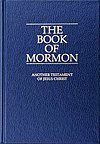

This article has multiple issues. Please help improve it or discuss these issues on the talk page. (Learn how and when to remove these template messages)
|
| Books of the Book of Mormon |
|---|
 |
| Small Plates of Nephi |
| Contribution of Mormon |
|
| Additions by Moroni |
|
|
|
The Book of Omni (/ˈɒmnaɪ/)[1] is one of the books that make up the Book of Mormon, a text that the Latter Day Saint movement regards as scripture. The book is written as the combined composition of several authors, the first of whom, Omni, provides the name of the book. According to the narrative, the book covers more than two centuries of Nephite history within one chapter of text. It refers to wars between the Nephites and Lamanites, the reign of Kings Mosiah and Benjamin, and their participation in the wars and journeys through the wilderness.
The Book of Omni is narrated as a combined composition by five different authors, each of which contribute a varying amount of content.[2] The first author, Omni, fought in wars against the Lamanites, but calls himself a wicked man, stating that he hasn't followed God's commandments.[3] He narrates his section of the book after possessing the small plates for 38 years and is succeeded in the narrative by Amoron. Amoron says that many of the wicked Nephites were killed in war.[4] but also mentions that the "righteous" Nephites were protected from their enemies.[5] The next author is Chemish, who explains that he received the plates from his brother Amoron[6] and saw him write his last words.[7] Next, Abinadom, the son of Chemish, recounts wars between the Nephites and the Lamanites and says he killed some Lamanites. He states that he doesn't know of any additional spiritual teachings that were presented during his life.[8]
The next narrator is Amaleki, the son of Abinadom. He speaks of Mosiah, who was king at the time of his birth.[9] Mosiah, he explains, led a number of Nephites out of the land of Nephi and into the wilderness, where they discovered the land of Zarahemla inhabited by the Mulekites. Mosiah became king over both peoples and taught the Nephite language to the Mulekites.[10] According to Amaleki, because Mosiah was a seer, the Mulekites asked him to interpret a stone their people found that tells the story of a Jaredite named Coriantumr.[11] An early LDS scholar of the Book of Mormon, Sidney Sperry, identifies Coriantumr as the last Jaredite king, whose account is found in the Book of Ether. He also speculates that Mosiah translated the stone with a Urim and Thummim.[12]
Amaleki proceeds to say that when Mosiah died his son, Benjamin, became king. There was a war between the Nephites and the Lamanites in which the Nephites were led by Benjamin.[13]
Amaleki further describes how some of the Nephites wished to return to the land of Nephi, apparently in an attempt to reclaim it. Two different companies set out in search of Nephi. The first attempt was unsuccessful because the participants fought among themselves. After that, a second group set out. At the time Amaleki stops writing, he says that the second group has never been heard of again. Later, in the Book of Mosiah, it is revealed that the second group was led by a man named Zeniff.[14]
Amaleki closes with some words about Christ, asserting that his words are true and that it is his intent to help others come unto Christ. He states at the close of the book that, having no descendants to carry on the record-keeping, he will give the records to King Benjamin.[15]
| Author | Verses |
|---|---|
| Omni | 1-3 |
| Amaron and Chemish | 4-9 |
| Abinadom | 10-11 |
| Amaleki | 12-30 |
According to authors Fatimah Salleh and Margaret Hemming, Omni wrote in order to maintain a record of the genealogical line. His grandson Chemish, on the other hand, wrote out of obligation.[17] Additionally, Grant Hardy suggests that the contributors to the Book of Omni treated record-keeping as "a genealogical responsibility rather than an opportunity for preaching or testifying."[18] Sharon Harris noticed a genealogical theme throughout Omni and identified three of its purposes. She suggests that the purposes of keeping the genealogy in allows the plates to be passed down, preserves teachings of the prophets, and demonstrates the larger influence of genealogy.[19] Terryl Givens claims that Omni wrote in a manner that suggests he believed the Nephites would eventually die out.[20] Adopting Robyn Warhol's term, professor of English at Vermont University Elizabeth Fenton calls the style of the Book of Omni "unnarration" due to a large lack of events while maintaining a "narrative voice."[21] Out of all the narrators, Amoron is the only one who doesn't finish his account with "And I make an end."[22]
Throughout the Book of Omni, its narrators claim that God causes the righteous among their people to win wars and punishes the wicked by letting them die in war. Salleh and Hemming take issue with this idea, saying that whether or not someone dies in war does not determine personal righteousness.[23] Sharon Harris points out that the points of contention mentioned by Abinadom and Amaleki lead to bodily injury; from this she concludes that the usage of "contention" here (and in other parts of the Book of Mormon) carries a more intense connotation than what modern readers think of.[24]
Book of Omni | ||
| Preceded by | Book of Mormon | Succeeded by |